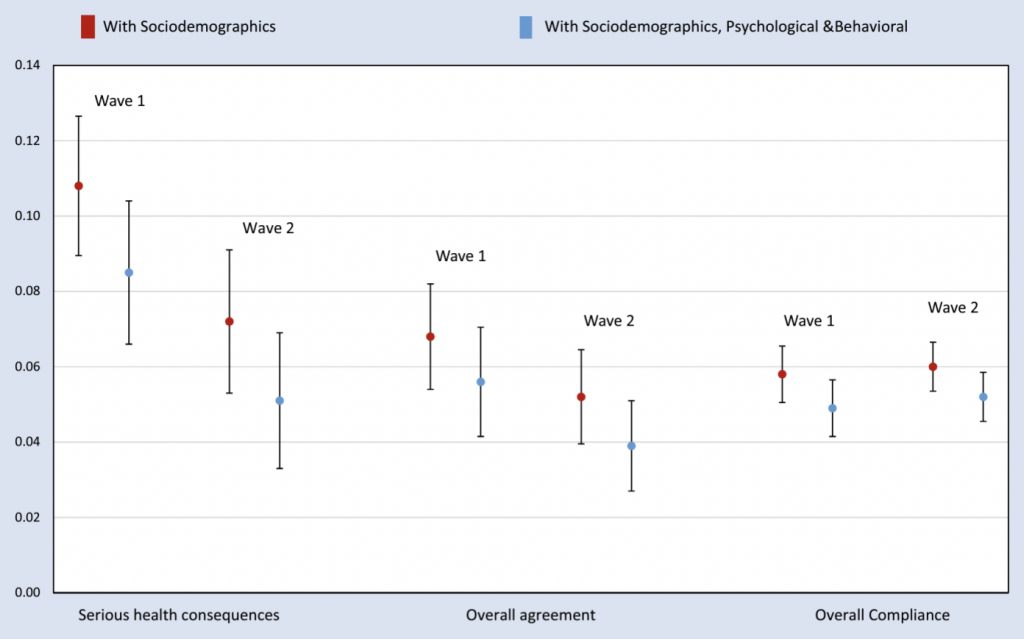Scanning the British media, you’d be hard-pressed to find an obvious gender difference in attitudes to lockdown. There are both men and women represented among prominent lockdown proponents, as well as among prominent lockdown sceptics.
Which makes a study published in Proceedings of the National Academy of Sciences last year all the more interesting. Vincenzo Galasso and colleagues analysed data from a survey carried out in eight OECD countries (including Italy, the U.K. and Australia) in March–April of 2020.
The survey measured respondents’ concern about the pandemic, their attitudes to lockdown measures such as closing schools and ‘non-essential’ businesses, and their self-reported compliance with government restrictions (see here for a full list of measures).
What did the researchers find? Across all eight countries (with the exception of Austria in the second wave), women were more likely than men to be concerned about the pandemic. They were also more likely to support lockdown measures, and reported greater compliance with government restrictions.
These findings are shown in the chart below. Note: “Overall agreement” corresponds to a measure of agreement with lockdown measures, while “Overall Compliance” corresponds to a measure of self-reported compliance. The units on the y-axis are percentage points.

As the chart indicates, the gender differences were not huge: women were about seven percentage points more pro-lockdown than men. But they were robust, and not explained by demographic characteristics like age, education or occupation type.
The finding that women are more pro-lockdown is somewhat surprising, given that COVID-19 appears to be more lethal for men. After all, you might expect groups that are at higher risk to be more in favour of restrictions.
The authors suggest that women’s greater compliance with government restrictions could help to explain the gender gap in risk of death from COVID-19, though I suspect any contribution is small. Women mount stronger immune responses to most pathogens, and this almost certainly explains why COVID-19 is more lethal in men.
Interestingly, the two Western states at the extreme ends of the ‘containment spectrum’ – New Zealand (the most restrictive) and South Dakota (the least) are both led by women. This illustrates that moderate gender differences in attitudes only go so far in explaining actual differences in policy.
The researchers’ finding is nonetheless interesting, and their paper is worth reading in full.











To join in with the discussion please make a donation to The Daily Sceptic.
Profanity and abuse will be removed and may lead to a permanent ban.
The Guardian ceased to be a neutral investigative paper about 10 years ago when MI6 paid them a visit after they had released some Snowden Files.
It is now run by Head Girls and read only by teachers.
They are sell about 60,000 copies – mainly to the BBC and other leftie organisations – and so were steadily going bankrupt so Bill Gates stepped in to prop them up.
Having, of course, been founded using Taylor’s profits from trading in US cotton…
With slave connections. Nice
https://www.youtube.com/watch?v=79t_gmfue54
Would The Guardian have quit “X” had Trump not won? I reckon not. This looks more like a fit of pique caused by Musk’s support for Trump than any principled stand against the immoral horrors of “X” which have remained consistent since Musk took it over.
If Trump had not won, it is likely that the US Gov’t would increase their on-going investigations and eventual prosecutions of Musk and all his companies. Goal to destroy his businesses and his life, along with same for so many others. Musk risked everything. All In. His style.
A friend commented about X that if you want to know what is really going on it is the only way to get news.
So much for the Grauniad. Throwing their toys out of the pram but taking their ball away so no one else can play with it and them.
Ha, ha, ha, ha, ha.
A fake newspaper if ever I saw one. You cannot get a straight take on anything in the Grauniad so I stopped even looking at it despite being free. After all it is only worth as much as anyone is prepared to pay for it and nowt is my bid.
Nuff said.
Socialists, by their nature, have to be capable of juggling two completely opposite propositions at the same time. Such as their support for gay people, but their support for religious groups who kill gay people. Or, supporting democracy, but not for you, just for their friends. It must be exhausting to live in such a fantasy world where everything matters, but nothing matters..
I have hopes that their heads will explode as a result.
Leftists support democracy – just so long as it comes up with the “correct” result.
A bit like the EU. Remember how they forced countries to re-run the Maastricht referendum if it produced the “wrong result?
Take the Red Pill and the Blue Pill at the same time.
The socialists I know stopped reading The Guardian many years ago when it was taken over by neoliberals.
Socialism is a form of mental illness.
Are your friends(?) receiving appropriate treatment?
As ‘stakeholder’ Blobs … have captured Western government departments and intergovernmental agencies … so ordinary people have been increasingly denied any formal mechanisms for confronting politicians with their grievances.
As the British Left became imbued with Marxism – after the Second world War – it also imbibed the Leninist poison that the working class is comprised of ignorant dolts who should be disenfranchised (and preferably replaced). This is the reason the contemporary marxo-fascists (e.g. The Guardian and its readers) believe that the leadership role in society belongs to “those who know better”. The purpose of this arrangement is to prevent politics from being an arena of public choices.
A fundamental left wing driving force is the march towards some distant Utopia where all social and political and moral aspects are perfect.
And the more recent development is the polarisation into those who are committed to the march, and those who are not. From which it ‘follows’ that those who don’t support the march to perfection must be social, political, and moral enemies.
Many years ago, The Guardian ran a TV advert video showing a skinhead pushing over a well-dressed man walking on the pavement.
The camera would pan out showing the skinhead was saving the man from being crushed by falling bricks.
Their catch line was “there is always two sides to every story”.
Unfortunately, now, The Guardian only show one side of the story and that is of the establishment corporatists and their Globalist, neoliberal, warmongering propaganda.
I used to buy the paper for 35 years and have witnessed its decline.
I stopped buying it about 15 years ago and now only comment on their page every time they get something wrong, which is quite often.
They are probably the most dangerous media outlet as they have this air of respectability and balance when in fact, they promote phony wars, bogus man-made climate change and dangerous vaccines.
I also remember that ad and thought is was very powerful, in fact it often pops into my head when shouty idiots can’t/won’t acknowledge there may be different interpretations of a situation.
I also bought the Guardian but not for well over 40 years.
Similar to me, I stopped buying it about ten years ago.
However I am no longer allowed to comment because I fell foul of their “Community Rules” about four years ago.
Needless to say they wouldn’t/couldn’t tell me precisely why the ban – but I think it just might have been my anti vaccine/bigpharma/Vallance comments. I had quite a few arguments with “Dave 4567” or similar who professed him/her/itself to be A Scientist, but I suspect he may well have been 77th
Yes, I was “moderated” for below the line comments years ago so I just troll them now on facebook.
I went to offGuardian when it first started but ended up being banned for berating the “viruses do not exist” clowns.
Wow! I just found that old Guardian advert on Youtube, using your description, and it is superb! Thanks for that. Here’s the link for those who haven’t seen it, or want to remember it:
The Guardian 1986 Points of View
It’s only when you get the whole picture, you can fully understand what’s going in
is something the people making the Guardian are still perfectly aware of. The 2024 version of this ad would continue with It’s our job to prevent this from ever happening!
Too true!
Establishment media do actually present “the other side” normally.
But they do so dismissively through ridicule, parody and distortion.
Just like the BBC then!
Yes. The BBC relies on the UK government for its funding by allowing it to tax the population with a license. The license is compulsory, and you will be fined if don’t have one. The UK government appoints the Director General. Ergo the BBC is “state funded”, part of the UK and Western world “establishment” and is a very poor news media outlet and far from “independent”.
I used to read it online and comment (in the years running up to the EU Referendum) and, despite my clear right-wing views, which were expressed very politely, I managed to never be censored/banned.
I reckon I’d last about 24 hours if I did that now. Dissent from their worldview is not tolerated.
And so has La Vanguardia in Spain.
What good news from Ben Pile, and a great photo of the Argentinian President Javier Milei!
His leading the Argentinians out of the CPO29 is astonishing and superb.
Why Google’s first reference to just about every single question asked is the Guardian? Why most public sector recruitment ads appear in the Guardian? Why Whitehall mandarins have limitless airtime in the Guardian? Are the BBC and the Guardian related?
“Focus groups and opinion polls have taken the place of dialogue between the public and politicians, and such forums are invariably controlled by Blobbish wonks whose views are narrowed even further by their funders’ priorities.”
Succinctly put. They ignore the masses and then present themselves as somehow “progressive”. Not an ounce of honesty between them.
Trump by name & his name has Trumped Cop (out)29 Fancy arranging this latest Private Jet Fest just as Trump forms his team of realists ! Starmer & Milipede now look like the dumbest arse lickers at this phoney gathering, glorious




Put the Chainsaw to Net Zero
Keep tweeting … and support / keep supporting the non-conformist alternative media/podcasts …. the keyboard and broadcasting warriors who are fighting back on our behalf. Many of them are free. Some charge a small amount – little more than the price of a coffee a month – so you CAN afford it.